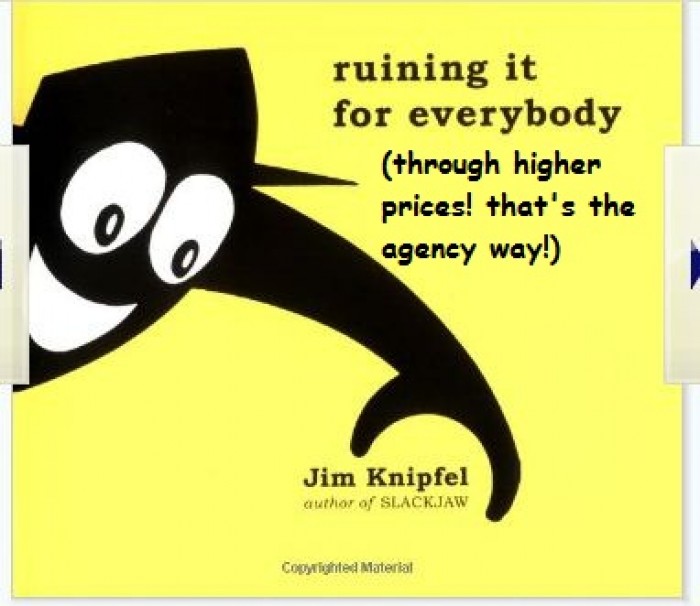
(underlying image courtesy Amazon)
The agency model is slowly kicking in, and it’s causing some disruption across the ebook world. Unfortunately, there’s really no way to dodge it; if you want to buy ebooks, you are at the mercy of the publishers. Even worse, the retailers who sell ebooks are also in the same position, and in the span of less than three months, they have been attempting to completely overhaul their method of doing business. So what kind of changes should we be expecting?
We already know that Kobo and Fictionwise have been forced to give up their incentive discount programs. Fictionwise also pulled books yesterday ahead of the price changes, and they are slowly adding things back in as the pricing structures stabilize. Amazon is also having some issues with the changeover; some books are showing up as “not available” due to geographic restrictions that were available prior to April 1. Some of this is due to contract failures, and some of this is due to bugs in the system as they rework everything. Hopefully, all will be back to normal soon!
Some books are not showing up at Amazon because the agency negotiations have not been completed; Penguin is still a holdout, so any new ebooks from them will NOT hit Amazon until an agreement is reached. Interestingly, everyone else (B&N, Kobo, etc) have all agreed to Penguin’s terms, so if you desperately need a title from them you have options.
Teleread had a great editorial the other day about how ebook stores can handle the sea change. Since they can’t compete on price, they need to find a niche that makes them attractive to consumers. It makes sense, but if bookstores plan to implement anything like that they need to hit hard on marketing. In the absence of pricing differences, where are consumers likely to shop? At the brand they know best. In the case of multi-format devices like tablets, it becomes an even bigger issue for lesser-known names. Traffic more than likely will head to Amazon, B&N and to a lesser extent, Kobo, due to their brand recognition. In addition, all three of these names offer an easy way to read purchased items on your computer, a tablet, or on a dedicated ebook reader. I honestly think Amazon will likely maintain their market share, with B&N and Kobo vying for second and third place. When you think ebooks, you think Amazon, first and foremost. With the right branding that can be changed, but maintaining the status quo won’t change that.
As of now, Random House is the only major publisher to refuse the agency model. This means there will not be any Random House titles in the iBookstore. Wondering what that means for you? Here’s a list of some major authors who are with Random House:
–Dan Brown
–John Grisham
–Sue Grafton
–Neil Gaiman
–Dean Koontz
–Laurell K Hamilton
–Nora Roberts
I’ve said this before, but I’m going to reiterate it again: iBooks is really not that great of a deal UNLESS you are 100% permanently committed to the iPad ecosystem. Even Dave Pogue, in his iPad review, remarked that iBooks were fairly limited in their scope outside the iPad. Say what you will about the Amazon Kindle or the B&N nook, but at least those formats and stores offer you some exposure and flexibility to move between devices. Since there is no (simple) way to remove DRM from an ebook, you need to make very careful choices about where you spend your book money.
Have you noticed any price hikes yet on your favorite authors? Did you buy an iPad for ebook reading, or will you go down fighting for eInk? Share your thoughts below!
